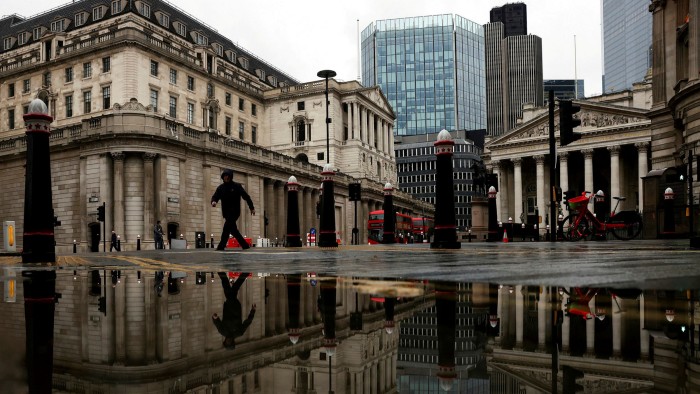Bank of England upgrades outlook for UK economy

Roula Khalaf, Editor of the FT, selects her favourite stories in this weekly newsletter.
The Bank of England upgraded its outlook for the UK economy on Thursday, but stressed it was in no hurry to reduce its support to boost the recovery from the coronavirus crisis.
After the March Monetary Policy Committee meeting, the central bank said that financial market moves in the past six weeks, which have seen sterling and the cost of government borrowing rise, had been warranted by the better immediate prospects for recovery.
In the minutes of the meeting, the BoE followed the US Federal Reserve in not taking any action to return financial market interest rates to the levels in early February.
The MPC said the news “on near-term economic activity had been positive”, adding that “recent plans for the easing of restrictions on activity may be consistent with a slightly stronger outlook for consumption growth in 2021 Q2 than was anticipated in the February report”.
The minutes said that improved economic data since February, a faster easing of coronavirus restrictions than it had previously expected, an extension of Covid-19 support in the Budget earlier this month and Joe Biden’s $1.9tn US stimulus programme had combined to produce the brighter short-term outlook.
However, it stressed that “the extent to which that news changed the medium-term outlook was less clear”.
Andy Haldane, the BoE’s chief economist, was even more upbeat than the committee consensus. “As I’ve been saying for months — drawing on the economics of coiled springs, and crouching tigers, and ‘Chicken Lickens’ — I do think more likely than not we are [set] for a rapid-fire recovery. That is coming, and I think that is coming soon,” he said shortly after the minutes were published.
Bond markets took the BoE’s relaxed attitude as a reason to sell off again, further raising government borrowing costs. The yield on 10-year gilts rose 0.04 percentage points on the day to hit 0.87 per cent, the highest since June 2019. At the time of the BoE’s February meeting, the equivalent gilt yield was 0.45 per cent.
But in what was essentially a holding statement before the BoE produces new detailed forecasts at its next meeting, in May, the committee said that it thought that aggregate financial conditions were broadly unchanged despite the large recent moves in financial markets.
Ruth Gregory, senior UK economist at consultancy Capital Economics, said that the BoE had provided financial markets with “no direct pushback against higher gilt yields”, even though the message the bank seemed to want to send was to “play down the prospect of [interest rate] hikes” that financial markets expect next year.
When voting on policy, the BoE decided not to follow the European Central Bank in increasing the pace at which it purchases government bonds, to signal that it wanted to limit the recent rise in government borrowing costs.
The MPC voted unanimously to leave official interest rates at 0.1 per cent and maintain the pace of its 2021 programme of creating money and buying an additional £150bn of government debt.
By the end of the year, this quantitative easing programme would leave the BoE sitting on £895bn of assets accumulated under the schemes since 2009.
But it stressed that it was still in no hurry to increase interest rates and the view of the committee was that, although the short-term prospects had improved, it was not clear that anything had changed in the medium term.
With MPC members wanting a fuller assessment of all of the moving parts of the economy at the May meeting, the committee reiterated its previous guidance that it was in no hurry to tighten monetary policy.
It would only increase interest rates from the current historic low when there was “clear evidence” that the recovery was eliminating spare capacity in the economy and the MPC was fulfilling its mandate of “achieving the inflation target of 2 per cent sustainably”, the minutes said.
Samuel Tombs, chief UK economist at consultancy Pantheon Macroeconomics, said the minutes showed the BoE was “still relaxed about the medium-term outlook for inflation”.
The BoE said the inflation rate would jump from the 0.7 per cent reading in January to close to the target in the spring when last year’s fall in petrol prices dropped out of the annual comparison over the next couple of months.
“These developments should have few direct implications for inflation over the medium term,” the BoE added, saying that households and businesses were confident the central bank could keep inflation under control. “Inflation expectations remain well anchored,” the MPC minutes said.
Comments